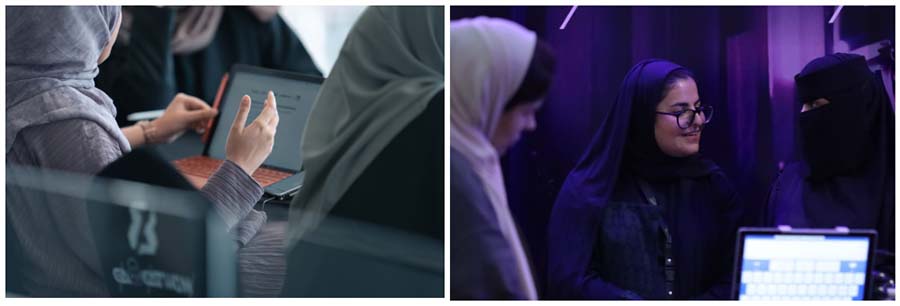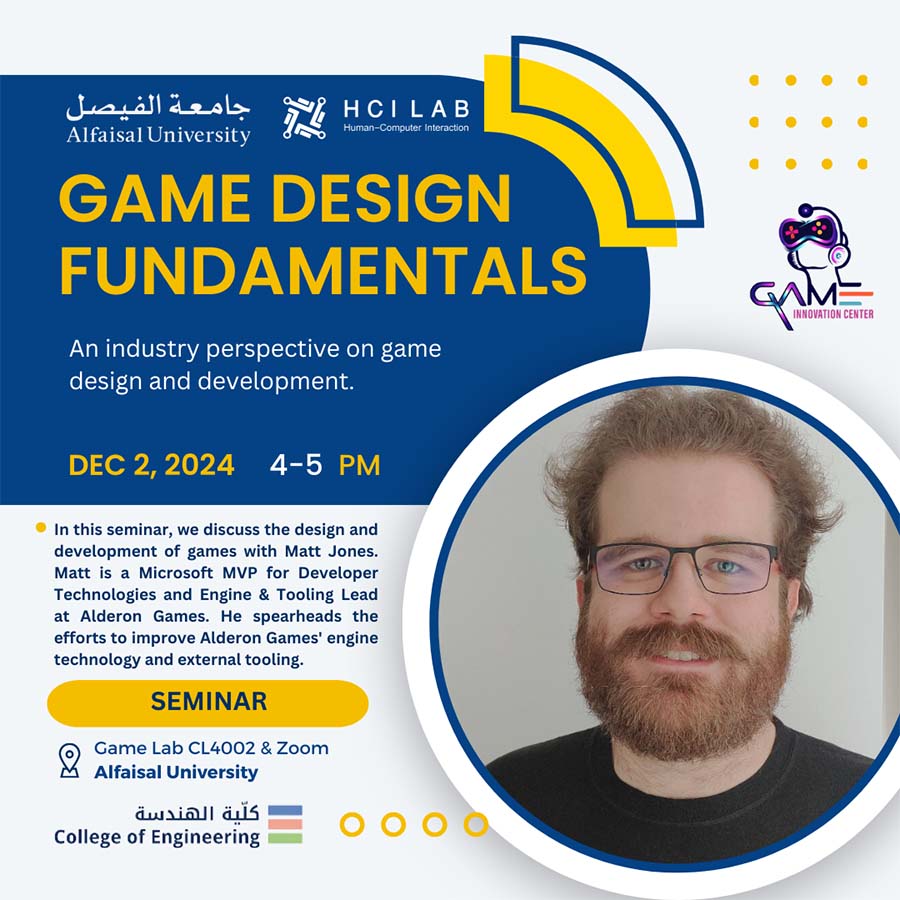The Human-Computer Interaction (HCI) Design Lab organized a seminar in collaboration with the Game Innovation Center on the 2nd of December 2024 at Alfaisal University. In this HCI Seminar, Matt Jones, an experienced game designer, explored the fundamentals of game design with a focus on creating and utilizing a Game Design Document (GDD) in the game development process. The session catered to aspiring game designers and seasoned professionals looking to refine their approach to game development. Participants included students enrolled in the Game Development and Digital Media Track in the Software Engineering program at Alfaisal University’s College of engineering and Advanced Computing.
Matt Jones is a Microsoft MVP for Developer Technologies and an Engine & Tooling Lead at Alderon Games. He spearheads the efforts to improve Alderon Games’ engine technology and external tooling. Matt kicked off the seminar by discussing the core principles of game design, including player engagement, mechanics, narrative integration, and balancing challenges with rewards. He emphasized that successful games are built on a strong foundation of these elements. Following that, he highlighted the role of the GDD in the game design and development pipeline. Matt explained the significance of design documents such as the GDD in the development process. He described it as the blueprint for a game, detailing its vision, narrative, art style and mechanics, and technical requirements. He highlighted how a well-crafted GDD ensures team alignment, minimizes miscommunication, and serves as a reference throughout production. The session included examples of successful GDDs from popular games and insights into what made them effective. Matt also shared anecdotes from his own projects, highlighting lessons learned and common pitfalls to avoid.

The seminar underscored the importance of planning and communication in game design. By emphasizing the role of the GDD as both a creative and organizational tool, Matt Jones equipped attendees with the knowledge to turn their game concepts into reality. Attendees had the opportunity to ask questions, ranging from overcoming creative blocks to handling scope creep. Matt encouraged designers to embrace iteration and adaptability in their workflows.
“Having Matt Jones, an experienced professional from the game industry, share his insights was an invaluable opportunity for our aspiring game designers,” says Dr. Areej Al-Wabil, a Software Engineering faculty member and co-founder of the Game Innovation Center at Alfaisal University. As the Director of the HCI Lab in Alfaisal’s AI Research Center, she highlighted how seminars that bridge academic research and the game industry play a crucial role in fostering innovation, collaboration, and knowledge exchange in game design. Dr. Areej reflected on the HCI Seminar, “These events often bring together students, professors, industry professionals, and researchers to discuss trends, challenges, and opportunities in the field. Matt’s deep dive into the Game Design Document (GDD) was particularly impactful. He not only explained its purpose but also provided practical tips and real-world examples that helped bridge the gap between academic concepts and industry practices. His engaging presentation style and willingness to answer questions made the material accessible and inspiring for students at all levels. This seminar gave our students a clearer understanding of what it takes to succeed in game development and reinforced the importance of collaboration and meticulous planning. It’s one thing to teach these principles in the classroom, but hearing it from a seasoned professional like Matt added credibility and excitement to the learning experience.”
Seminars like “Game Design Fundamentals” are invaluable assets to a vibrant academic environment at any university. By bringing industry professionals like Matt Jones to share their expertise, these events bridge the gap between classroom learning and real-world application, enriching the educational experience at a time in which the National Gaming and Esports Strategy (NGES) in Saudi Arabia is driven by the creativity and energy of game developers, gaming enthusiasts, and gamers, who are at the heart of the strategy. These activities inspire students, spark meaningful discussions, and foster a dynamic learning culture. Such opportunities not only enhance the academic curriculum in game design and development but also prepare students to confidently step into the professional world of the game industry with knowledge, skills, and connections that set them apart.














